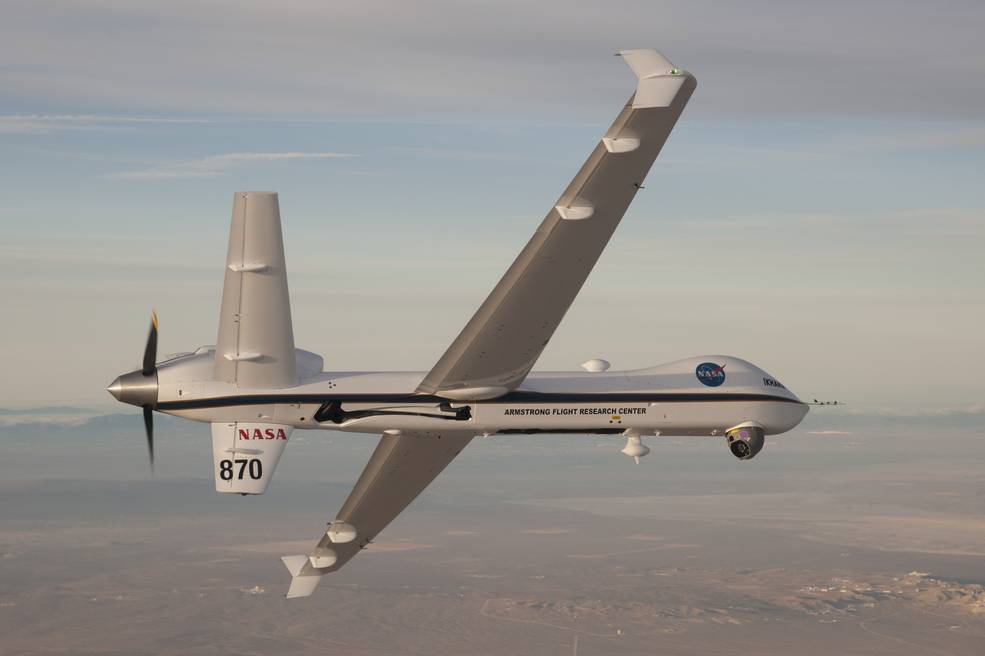Daily Business Report-June 29, 2015
NASA’s Ikhana is being used to test a system that will allow uncrewed aircraft to fly routine operations within the National Airspace System.
NASA, General Atomics and Honeywell Test
Use of Unmanned Aircraft to Fly in U.S. Airspace
NASA, working with government and industry partners, is testing a system that would make it possible for unmanned aircraft to fly routine operations in United States airspace.
Through the agency’s Unmanned Aircraft Systems Integration in the National Airspace System project, NASA, General Atomics Aeronautical Systems Inc. and Honeywell International Inc. are flying a series of tests which began on June 17 and will run through July at NASA’s Armstrong Flight Research Center in California.
“We are excited to continue our partnership with GA-ASI and Honeywell to collect flight test data that will aid in the development of standards necessary to safely integrate these aircraft into the National Airspace System,” said Laurie Grindle, project manager at Armstrong.
This is the third series of tests that builds upon the success of similar experiments conducted late last year that demonstrated a proof-of-concept sense-and-avoid system.
“This is the first time that we are flight testing all of the technology developments from the project at the same time,” Grindle said.
This series of tests is made up of two phases. The first is focused on validation of sensor, trajectory and other simulation models using live data. Some of the tests will be flown with an Ikhana aircraft, based at Armstrong, that has been equipped with an updated sense-and-avoid system, as well as other advanced software from Honeywell.
Other tests will involve an S-3B plane from NASA’s Glenn Research Center in Cleveland, serving as a high-speed piloted surrogate aircraft. Both tests will use other aircraft following scripted flight paths to intrude on the flight path the remotely-piloted craft is flying, prompting it to either issue an alert or maneuver out of the other aircraft’s path. These flights will also conduct the first full test of the traffic alert and collision avoidance system on a remotely piloted aircraft.
The second phase of the third test series will begin in August and will include a T-34 plane equipped with a proof-of-concept control and non-payload communications system. It will evaluate how well the systems work together so that the aircraft pilots itself, interacts with air traffic controllers and remains well clear of other aircraft while executing its operational mission. The aircraft, which will have an onboard safety pilot, will fly an operationally representative mission in a virtual airspace sector complete with air traffic control and live and virtual traffic.
Hotels — Not the Convention Center — Are What’s
Keeping Comic-Con from Committing to San Diego
Voice of San Diego
It turns out getting Comic-Con to stay in town for 2017 and 2018 is more about discounted hotel rooms than the size of San Diego’s Convention Center.
Comic-Con and the Convention Center Corp. both told Voice of San Diego that some hoteliers’ unwillingness to sign off on agreements to discount blocks of hotel rooms for attendees is what’s keeping the massive comic and entertainment convention from committing to San Diego.
Comic-Con’s learned to live without the promised Convention Center expansion for now, instead relying on event spaces at Downtown hotels to address its needs outside the facility.
But it needs rooms at a reduced price for the tens of thousands of visitors the event brings to the region — even though San Diego’s already flush with tourists in the summer months.
“There are not enough rooms discounted and attendees are not able to get into the room block,” said Steven Johnson, spokesman for the Convention Center. “That’s why Comic-Con isn’t booked right now.”
Getting into a room block can be the difference between paying $299 per night and $499 per night for the same room, Johnson said, though specific discounts vary among hotels.
Those savings may not be a major issue for surgeons attending a medical conference, but Comic-Con attracts more than 130,000 attendees from a broad range of income levels who feel the pinch.
Last year, hotels committed 56,600 discounted hotel room nights, but Comic-Con could easily fill twice that.
When business is slow, offering large room blocks is a no-brainer for hotels. But when large events like Comic-Con send the county’s hotel occupancy rates sky-high, agreeing to a discount means turning away higher profits.
“They know they are going to sell out because there is such a demand,” Johnson said. “(Hotel managers are) not worried about 2020 right now … It’s just common sense for them, and I totally understand.”
USC Establishes Alzheimer’s
Research Institute in San Diego
The Keck School of Medicine of USC has established the USC Alzheimer’s Therapeutic Research Institute in San Diego. Distinguished Alzheimer’s disease scientist Paul Aisen is the founding director and is being proposed for professor of neurology at the Keck School of Medicine.
Aisen will lead the institute in pursuit of its mission to accelerate the development of effective treatments for Alzheimer’s disease through innovative, collaborative, multicenter clinical trials.
“Dr. Aisen has been a leading figure in Alzheimer’s disease research for more than two decades, having developed novel methodologies as well as designed and directed many large therapeutic trials,” said Dean Carmen A. Puliafito. “We are proud to have him join USC, where his expertise and leadership will help the Keck School and USC create a leading hub of basic, translational and clinical research in neuroscience and neurological diseases.”
USC is recruiting faculty researchers to focus on the human brain and its role in numerous medical conditions, including Alzheimer’s and multiple sclerosis. These efforts align with President Barack Obama’s BRAIN Initiative, announced in April 2013.
“This is welcome news because it brings more firepower to San Diego’s cutting-edge efforts to fight the disease through initiatives like The Alzheimer’s Project,” said county Supervisor Dianne Jacob, who spearheaded the creation of the Alzheimer’s Project last year. “No place in the world is doing more to address Alzheimer’s research and care, and clearly, USC wants to be part of that.”

Carlsbad Executive Plaza Sold for $24 Million
The 133,079-square-foot Carlsbad Executive Plaza has been sold to TA Associates for $24 million. The seller was Brookwood Financial.
Located on 9.5 acres along Palomar Airport Road, the Carlsbad Executive Plaza encompasses four multi-tenant, Class A office buildings.
As part of the master-planned Carlsbad Airport Business Centre, it is adjacent to the McClellan-Palomar Airport. DTZ was the broker in the sale.
USD Offers Sessions for Seniors
Classes on desalination, drones, faith and the best new books for summer reading are among the sessions offered at the 2015 summer program of the University of the Third Age at University of San Diego. The series of programs, aimed at people 55 and older, runs from July 13 through July 30.
Peter MacLaggan, vice president of Poseidon Water, will present “Next on Tap: The Carlsbad Desalination Project Completion.” David Cain of Ballard Spahr LLP, and Treggon Owens, CEO of Aerial MOB, will discuss “From Drawing Boards to Daily Buzz: Commercial Drones in the New Age.”
USD alumnus Michael McDevitt, curator of the Cora Evans Writings, will present “Will Cora Evans Become the First Woman Saint of California?” Sandy Steel, retired San Diego County librarian, will discuss new books out in the summer.
The three-week session also includes workshops in Mac Computers, iPad/Digital Photography/Social Media, and Tai Chi Chuan exercise. The cost of $175 includes workshops, presentations and a luncheon.
For more information and registration, go to www.sandiego.edu/u3a or call (619) 260-4585.
Council to Consider Amending Water Restrictions
The City Council today will consider municipal code amendments to align San Diego’s restrictions on water use during the drought with state and County Water Authority regulations.
The action is in response to an order by state officials for San Diego to reduce consumption by 16 percent.
The amendments proposed by city staff include limiting outdoor watering in San Diego to two days a week for no more than five minutes per station and prohibiting irrigation within 48 hours of measurable rain. The provisions also would allow the city to assign watering days and times, clarify language on the washing of pavement and define different types of fountains.
The city has been imposing restrictions on water use since last year, but its regulations don’t include all the orders by the state or San Diego County Water Authority.
The amendments were approved unanimously by the council’s Environment Committee last week. Committee Chairman David Alvarez said some of the restrictions are becoming “the new normal.”
Regulations already in place in the city set allowable times for people to water their lawns and cars, require leaks to be fixed within 72 hours, demand that hoses only be used with shut-off nozzles and that fountains be turned off.
— City News Service
Personnel Announcements
Navy Vet Joins Cubic Global Defense

Navy Vice Adm. David Buss (Ret) has been appointed vice president and deputy to the president of Cubic Global Defense, a business unit of San Diego’s Cubic Corp. Buss will lead the business strategy for Cubic’s live, virtual and constructive training for combined air, land and naval forces.
Buss has more than 36 years of service in the Navy, where he recently retired in the rank of vice admiral after serving more than two years as Commander, Naval Air Forces. Buss has served as the deputy commander of U.S. Fleet Forces Command in Norfolk, Va., while simultaneously commanding Task Force 20. He also commanded Carrier Strike Group 12, USS Enterprise Carrier Strike Group.
Buss graduated with distinction from the U.S. Naval Academy in 1978 and was designated as a naval flight officer in the venerable A-6 Intruder in 1979. Buss commanded USS Sacramento during the opening stages of Operation Enduring Freedom.


